
Carlos Gardel was a French-born Argentine singer, songwriter, composer and actor, and the most prominent figure in the history of tango. He was one of the most influential interpreters of world popular music in the first half of the 20th century. Gardel is the most famous popular tango singer of all time and is recognized throughout the world. Described variously as a baritone or tenor because of his wide vocal range, he was known for his rich voice and dramatic phrasing. Together with lyricist and long-time collaborator Alfredo Le Pera, Gardel wrote several classic tangos.

Palermo is a barrio or neighborhood of Buenos Aires, Argentina. It is located in the north of the city, near the Rio de la Plata.

Line D of the Buenos Aires Underground runs from Catedral to Congreso de Tucumán. The line opened on 3 June 1937 and has been expanded to the north several times. The line is currently 11 km long and has 16 stations, while running approximately parallel to the city's coastline.
Alfredo Le Pera was a Brazilian-born Argentine journalist, dramatist, and lyricist, best known for his brief but fruitful collaboration with the renowned tango singer Carlos Gardel. He died in a plane accident with Gardel when he was at the height of his career.
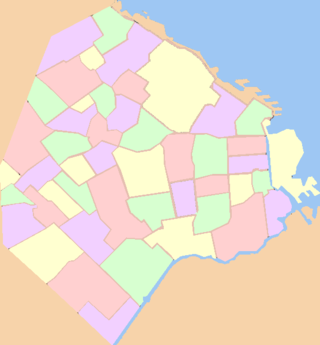
Buenos Aires, autonomous city and capital of Argentina, is composed of forty-eight neighborhoods. Since 2008, the city is also legally divided into communes, each one including one or more barrios. Among the most visited and populated barrios are Palermo, Recoleta, Puerto Madero, Belgrano, San Telmo, La Boca, Monserrat and Caballito. Sectors of the city are also traditionally known as neighborhoods by the inhabitants of Buenos Aires, but not officially by the authorities of the city; some examples include Chinatown, Barrio Norte and the Microcentro.
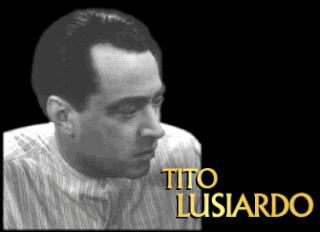
Tito Lusiardo was an iconic Argentine film actor and tango singer of the classic era.

The Life of Carlos Gardel is a 1939 Argentine musical film directed by Alberto de Zavalía and starring Hugo del Carril, Delia Garces and Elsa O'Connor.

Enrique Domingo Cadícamo was a prolific Argentine tango lyricist, poet and novelist. From an initial Symbolist bent, he developed a distinctive, lunfardo-rich style from an early age, and by 1925 he had his first piece, Pompas de jabón, sung by Carlos Gardel. Other notable compositions include Madame Ivonne, Che, papusa, oí, Anclado en París, Muñeca brava, Al Mundo le falta un Tornillo, Pa' que bailen los muchachos and Los mareados, originally titled Los dopados, about a couple that vows to get drunk after realizing their love is over.

Domingo Alberto Tarasconi was an Argentine football forward. Raising from Club Atlético Atlanta, he played most of his career for Boca Juniors where he won 9 official titles and became the all-time 4th highest scorer in the club's history, behind Martín Palermo, Roberto Cherro, and Francisco Varallo.
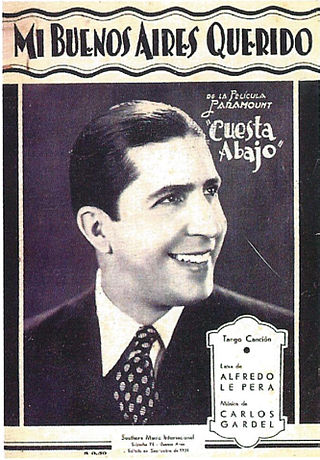
'Mi Buenos Aires querido' is a tango with music by Carlos Gardel and lyrics by Alfredo Le Pera, released in 1934. It is featured on the soundtrack of its eponymous movie directed by Julio Irigoyen.

Terig Tucci was an Argentine composer, violinist, pianist, and mandolinist.

Elías Isaac Alippi was an Argentine actor, theatrical impresario, film director and theater director, who was born and died in Buenos Aires. He is also remembered as an excellent tango dancer.

Carlos Gardel is a station on Line B of the Buenos Aires Underground.

The Hipódromo Argentino de Palermo is a horse racing course located in Buenos Aires, Argentina, and one of the most important in the country, hosting 120 days of racing and 1,400 races every year. Races are hosted three days a week, with about nine races per racing day. The property is open to the public free of charge twenty-four hours a day.
Carmen Micaela Risso de Cancellieri, better known as Carmencita Calderón, was an Argentine tango dancer.

The Guitar of Gardel is a 1949 Argentine-Spanish musical film directed by León Klimovsky and starring Agustín Irusta, Carmen Sevilla and Antonio Casal. The film is based on the life of the tango star Carlos Gardel.

Cecilio Pablo Fernando Podestá was a Uruguayan-Argentine stage actor, singer, acrobat, sculptor and painter. He is considered to be one of the most prominent actors of classical Argentina theatre, and along with his brothers, was one of the founders of the Circo criollo. A number of institutions and places are named after him, including a town in Buenos Aires Province, and film awards known as the Premios Pablo Podestá.
The House Is Serious (La Casa es Seria) is a picaresque musical short film directed by Lucien Jaquelux (credited as Jaquelux). It belongs to a series of French films starring Argentinian tango singer Carlos Gardel and was made by Paramount Pictures in its French Joinville Studios at Joinville-him-Pont. The film features Gardel and co-stars the Argentinian-Spanish actress Imperio Argentina. The script was written by the Brazilian Alfredo Le Pera. Gardel sings two songs with Le Pera; Memory malevo and Want to me, the latter having been recorded on a disc.
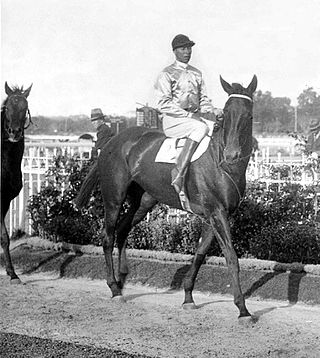
Irineo Leguisamo was a Uruguayan jockey. Also known as El Pulpo, El Eximio or El Maestro, he competed for over 57 years at racecourses in Uruguay and Argentina and was considered the foremost South American rider of the 20th century.
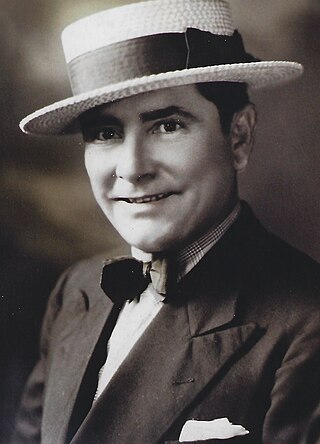
Natalio Cirilo Banegas, also known popularly by the nicknames Don Nata, Don Nata Banegas, Benegas and Trapiche, was an Argentine jockey, steeplechase jockey, horse trainer and owner of thoroughbred horses, an emblematic figure in the horse racing history of Argentina and of the City of Rosario during the golden age of equestrianism in the first half of the 20th century. He received the highest national and regional statistics (scores) of Argentina.
















